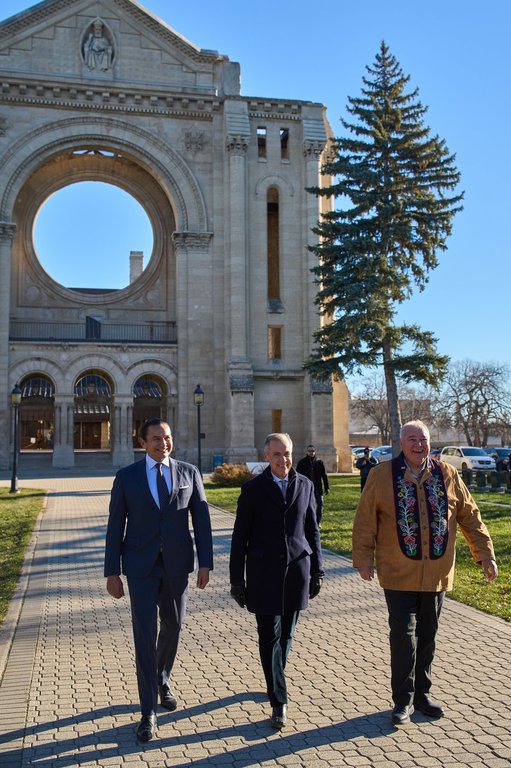Federal and Manitoba governments announce more steps toward port project
Advertisement
Read this article for free:
or
Already have an account? Log in here »
To continue reading, please subscribe:
Monthly Digital Subscription
$0 for the first 4 weeks*
- Enjoy unlimited reading on winnipegfreepress.com
- Read the E-Edition, our digital replica newspaper
- Access News Break, our award-winning app
- Play interactive puzzles
*No charge for 4 weeks then price increases to the regular rate of $19.00 plus GST every four weeks. Offer available to new and qualified returning subscribers only. Cancel any time.
Monthly Digital Subscription
$4.75/week*
- Enjoy unlimited reading on winnipegfreepress.com
- Read the E-Edition, our digital replica newspaper
- Access News Break, our award-winning app
- Play interactive puzzles
*Billed as $19 plus GST every four weeks. Cancel any time.
To continue reading, please subscribe:
Add Free Press access to your Brandon Sun subscription for only an additional
$1 for the first 4 weeks*
*Your next subscription payment will increase by $1.00 and you will be charged $16.99 plus GST for four weeks. After four weeks, your payment will increase to $23.99 plus GST every four weeks.
Read unlimited articles for free today:
or
Already have an account? Log in here »
WINNIPEG – One of the federal government’s proposed nation-building projects — the expansion of the Port of Churchill and the rail line that serves the remote northern community — will require a lot of work, Prime Minister Mark Carney said Sunday.
“We’ll move forward in steps,” Carney said at the start of a 45-minute meeting with Manitoba Premier Wab Kinew in Kinew’s office.
“It’s a very big project, very ambitious, and a lot of work to do, starting now,” he said in French.

Manitoba has long touted Churchill, a town of 900 people on the shore of Hudson Bay, as a port with huge potential to ship goods via the Arctic Ocean to Europe and elsewhere. The project recently made a list of initiatives being considered as “transformative” by the federal government although it was not among five projects highlighted in September for an initial round of nation-building infrastructure work.
There are hurdles to expanding shipping through Churchill — a long rail line through remote terrain that needs upgrading, a short ice-free season in Hudson Bay, and storage capacity in Churchill, which is not connected by road to other communities.
Carney confirmed funding Sunday for a study on the potential of specialized icebreakers, ice tugs and research vessels at the port. Kinew announced $51 million for improvements to the rail line and a new critical-minerals storage facility at the port.
Kinew also said he and Carney have agreed to meet every three months to discuss the project and other matters.
“When we’re thinking about a major piece of infrastructure, realistically, a five- to 10- year timeline is probably realistic,” Kinew said after the meeting.
The project also requires a Crown-Indigenous corporation the province has yet to establish.
Carney was to attend the Grey Cup game later in the day. Kinew gave him a football bearing the logo and colours of the Winnipeg Blue Bombers, who were not in the Canadian Football League championship game.
Earlier, the two politicians attended a ceremony marking the 140th anniversary of the death of Métis leader Louis Riel.
“A hundred-and-forty years after his execution divided a young nation, Louis Riel’s legacy helps to unite a maturing Canada — a Canada that is determined to reconcile with and learn from our history,” Carney told dignitaries and members of the public at Riel’s grave in the St. Boniface neighbourhood.
The Manitoba Métis Federation said Carney is believed to be the first sitting prime minister to attend the annual ceremony at Riel’s grave.
Riel fought for a list of rights that paved the way for Manitoba’s entry into Confederation in 1870. He was arrested after a later rebellion in what is now Saskatchewan, convicted of treason and hanged.
This report by The Canadian Press was first published Nov. 16, 2025


